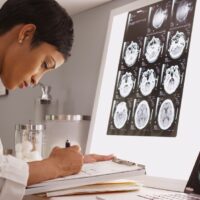Medical Expert Witness Testimony and Reasonable Degree of Certainty

The phrase “reasonable degree of scientific certainty” or “reasonable degree of scientific probability” has been cropping up in courtrooms for decades. It is used as a metric for admissibility, as well as evidence of confidence and reliability in an expert’s stated findings. But what does the phrase actually mean? Must the opinion be accepted in the medical community or the greater scientific community? Continue reading for a discussion of the “reasonable degree of certainty” standard for expert witnesses, and reach out to an expert medical witness at Neurosurgery MedLegal Services, LLC with any additional questions.
Reasonable Degree of Certainty Is not a Scientific Standard
Contrary to popular belief, the term “reasonable degree of scientific certainty” or “reasonable degree of medical certainty” is not actually a scientific standard. In courtrooms, attorneys will often ask expert witnesses to confirm that they are “reasonably certain” of their conclusions, or that they are confident to a “reasonable degree of medical probability” of their opinions or conclusions. These questions are meant to elicit a level of confidence in the expert’s opinion that can render the opinion admissible. They are also meant to enhance the witness’s credibility in the eyes of the finder of fact.
The admissibility of an expert’s opinion depends upon whether it’s properly supported by science, facts, and the evidence in the record. Pursuant to Federal Rule of Evidence 702, for example, assuming the expert is qualified in the field, an expert’s testimony may be admitted provided:
- The testimony is based on sufficient facts or data;
- The testimony is based on reliable methodology;
- The expert properly applied good methodology to the facts of the case.
The federal rules of evidence do not directly ask the expert to state an opinion to a “reasonable degree of scientific certainty.” Instead, the expert’s testimony must be based on data, obtained and analyzed using proper methodology, which is then properly applied to the matter at bar.
Scientific Experts Do Not Like the Phrase “Reasonable Degree of Certainty”
The National Commission on Forensic Science (NCFS) issued a statement on the phrase “reasonable scientific certainty.” They advised scientific experts not to use the phrase and asked legal professionals to refrain from doing so as well. According to the statement: “[M]edical professionals and other scientists do not routinely use ‘to a reasonable scientific certainty’ when
expressing conclusions outside of the courts since there is no foundational scientific basis for its use.” They go on to assert that “such terms have no scientific meaning and may mislead jurors or judges when deciding whether guilt has been proved beyond a reasonable doubt.”
Medical experts shy away from such terminology where possible. A 2015 study conducted by the Penn State College of Medicine, for example, found that only 37% of the surveyed medical experts were comfortable with defining the term “reasonable degree of medical certainty,” even though 95% had testified in court. When pressed, most of those surveyed defined “reasonable certainty” as a greater than 90% chance that their claim was true, i.e., a low margin of error.
In practice, scientists will either refer to a specific degree of certainty about a relationship or outcome–e.g., “The results of the DNA test place the probability of paternity at 99.99%” –, refer to a low margin of error, or simply express the personal confidence of the scientist. A “reasonable degree of medical certainty” is a legal term of art that appears to have arisen as a flourish of speech, rather than a legal standard.
Some Jurisdictions Use a “Reasonable Degree of Certainty” or “Reasonable Degree of Probability” Standard
To the chagrin of NCFS and other professionals, some courts do require expert opinions to be supported by a “reasonable degree of scientific certainty” or a “reasonable degree of scientific probability” to be admissible. For example, Va. Code § 8.01-399(B) provides that a medical diagnosis is only admissible if it was offered to a “reasonable degree of medical probability.” A number of Virginia courts have used the same standard when evaluating the admissibility of an expert’s opinions.
There’s no general consensus about the precise meaning of the phrase, even across legal jurisdictions. The best an expert witness can do is offer their opinion based on proper data, analysis, and methodology, as informed by their education and experience. It’s up to the lawyers to define what actually supports a “reasonable degree of certainty” and to elicit testimony supporting such a finding in order to ensure admissibility.
If you need a dedicated, professional, and effective expert witness in a personal injury, medical malpractice, or product liability case, contact the offices of Neurosurgery Medlegal Services, LLC, at 866-659-8051.